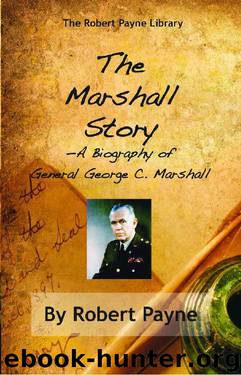The Marshall Story, A Biography of General George C. Marshall (The Robert Payne Library Book 6) by Robert Payne

Author:Robert Payne [Payne, Robert]
Language: eng
Format: epub
Publisher: Brick Tower Press
Published: 2014-03-09T22:00:00+00:00
It was characteristic of Marshall that he should have employed a succession of dry military clichés; it was also characteristic of Marshall that we should be able to see through his clichés to the real emotions hiding beneath, while the inflated language of MacArthur's messages during this same period is suspect and sterile.
When the Philippines were lost, the need for a victory in the West became urgent, and throughout January and February and far into the spring there were discussions on how this should be brought about. The innumerable theaters which Marshall had at one time contemplated were reduced to three on March 8: on this day it was decided that America should take responsibility for the Far East, Great Britain for the Middle East and both together should assume responsibility for the recovery of Europe; and it was against Europe, where their combined forces could be directed, that plans were now being prepared. Marshall did not waver in the belief that forces could be landed in Europe in 1942. He relied on Napoleon's maxim that the strength of an army, like power in mechanics, is a product of mass multiplied by velocity, and he thought that holes could be punched wherever desired in Hitler's fortress of Europe, providing that a large mass could be assembled with speed and sent off with determination and velocity. In this he was probably wrong. Statistically, such an army could have been produced, but questions of morale entered the grand design. The British Army in Britain had not yet recovered from its mauling in France, and through the first six months of the year the American Army was still not a first-class force. As General McNair described it in February: "It was capable of fighting creditably, but with excessive losses." Though both would have attacked magnificently, it is doubtful whether they would have possessed the resolution for victory which comes with the knowledge of one's own superiority over the enemy.
On March 2 5 the President, Hopkins and the American Chiefs of Staff lunched together at the White House. It was a meeting of some significance for the future of the war. The President was discussing the possible direction of attack against Germany. He mentioned the Middle East and the Mediterranean basin, and the last charmed him. Marshall, with some help from Stimson, turned the conversation to the Atlantic, and held it there, giving an outline of his own views. The President finally agreed with Marshall and suggested that the whole matter be laid before the Joint Chiefs of Staff. Thereupon Hopkins made the plea that it should not go to the Joint Chiefs at all, but should be presented by someone—he meant, according to Stimson, Marshall—to Churchill and the British Chiefs of Staff in London, Admiral Sir Dudley Pound, Air Chief Marshal Sir Charles Portal and Field Marshal Sir Alan Brooke. The reason was simple: Hopkins hoped a confrontation in the conference room at 10 Downing Street would be more decisive than memoranda passed through the hands of Sir John Dill from Washington to London and back again.
Download
This site does not store any files on its server. We only index and link to content provided by other sites. Please contact the content providers to delete copyright contents if any and email us, we'll remove relevant links or contents immediately.
| Afghan & Iraq Wars | American Civil War |
| American Revolution | Vietnam War |
| World War I | World War II |
Waking Up in Heaven: A True Story of Brokenness, Heaven, and Life Again by McVea Crystal & Tresniowski Alex(37002)
Empire of the Sikhs by Patwant Singh(22170)
We're Going to Need More Wine by Gabrielle Union(18072)
Hans Sturm: A Soldier's Odyssey on the Eastern Front by Gordon Williamson(16610)
Leonardo da Vinci by Walter Isaacson(11901)
The Radium Girls by Kate Moore(10906)
Educated by Tara Westover(7061)
Tools of Titans by Timothy Ferriss(6944)
How to Be a Bawse: A Guide to Conquering Life by Lilly Singh(6692)
The Last Black Unicorn by Tiffany Haddish(5073)
Permanent Record by Edward Snowden(4996)
The Rise and Fall of Senator Joe McCarthy by James Cross Giblin(4842)
Promise Me, Dad by Joe Biden(4444)
The Wind in My Hair by Masih Alinejad(4424)
The Crown by Robert Lacey(4104)
A Higher Loyalty: Truth, Lies, and Leadership by James Comey(4031)
The Iron Duke by The Iron Duke(3639)
Joan of Arc by Mary Gordon(3256)
How to be Champion: My Autobiography by Sarah Millican(3185)
